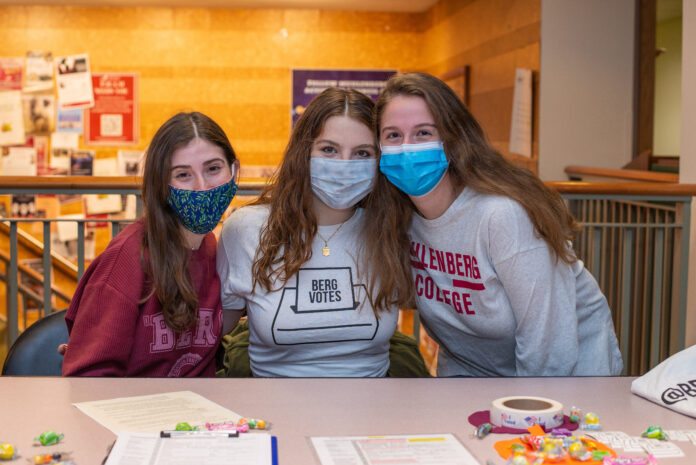
Last year, 91 percent of Muhlenberg students were registered to vote in the highly contentious presidential election. New data from the Institute for Democracy & Higher Education shares that voting rates at Muhlenberg are one of the highest in the country, according to a new report.
According to data gathered by Beth Halpern, director of the Office of Community Engagement (OCE), “82.6 percent of students voted in last year’s election, far above the national average of 66 percent.” BergVotes pushed for students to vote this year, as there is often less turnout when there is not a general election occurring.
BergVotes was present in Seegers Union all day. The polling center, which is run by Lehigh County, was open from 7 a.m. to 8 p.m. and was held in Seegers rooms 108-110. “This year, we focused a lot on directly connecting with students in order to increase voting awareness,” said Ryan Abrams ‘23, president of BergVotes. “We had a lot of tabling events with different incentives to draw in students, like a [General’s Quarters] gift card raffle. I am so proud of the work the BergVotes and OCE team has done.”
While they might not be as widely publicized, local elections are just as important as national ones. Some of the positions up for a vote in Allentown included mayor, city council members and magistrates. “Local elections are extremely important and impact the lives of day-to-day citizens. Positions such as the school board, city council and mayor make decisions that dictate access to resources, curricula taught in the schools, infrastructure fixes on roads and bridges and the distribution of federal funds to address [local] issues,” says Halpern. “Making your voice heard through the electoral process is important and a right that has been hard fought for over generations.”
Students agreed with that sentiment. Ryan Steremberg ‘25 decided to vote with an absentee ballot instead of in Allentown because he wanted to make an impact on his hometown. For him, the process was simple: “I just had to get a paper request form for the absentee ballot and then filled it out and mailed it in.” Steremberg continued, “It’s important to vote because if people stop voting, then there is no democracy. I wanted to have a say as a voter for what the future of my town should look like.”
“Making your voice heard through the electoral process is important and a right that has been hard fought for over generations.”
Ethan Yazdanyar ‘25 voted at Muhlenberg. He had a positive experience voting and even though he “was the last person to vote at Seegers Union, the staff were very helpful.” It was his first time voting, something he believes is very important. “We have the right as citizens to effect change at several levels. It is common for people to prioritize presidential elections, however, voting at the local level causes change right in our community,” he said.
Some students who registered to vote did not have their forms properly processed by the Lehigh County Government Center, likely the result of a mistake on the forms or the need to sign more documentation that did not arrive in time to meet the voter registration deadline.
To prevent such issues from happening in the future, Cydney Wilson ‘23, vice president of BergVotes encourages “students to register as early as possible, so they have enough time to rectify mistakes they may have made on their forms.”
“It’s important to vote because if people stop voting, then there is no democracy. I wanted to have a say as a voter for what the future of my town should look like.”
Despite there being some confusion over voter registration, voting this year was easier for some than it was last year due to the pandemic. “My experience voting this year was a lot less turbulent than last year’s November election due to the complications caused by the pandemic,” said Kyle Ropski ‘22. Even though new voting laws aimed at reducing alleged voter fraud have complicated the voting process, as Ropski said, the good news is that “the voting process can still be a relatively easy process.”





















